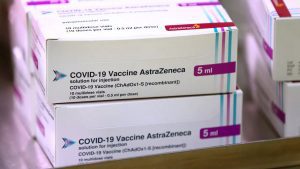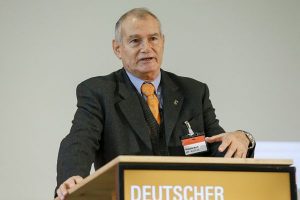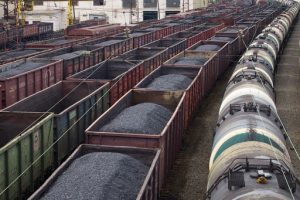
The vaccine produced by AstraZeneca may be delivered to Ukraine next week, Chief State Sanitary Doctor Viktor Liashko said.
“We are waiting for the Pfizer vaccine. Perhaps the first will be the AstraZeneca vaccine. We will receive two products next week. There are questions about the Pfizer vaccine, which we receive as part of the COVAX initiative, which is supplied to Ukraine for free,” Liashko said on the air of the Right to Power (Pravo na Vladu) program on 1+1 TV channel on Thursday night.
He noted that bureaucratic processes are currently underway.
Liashko said that vaccines would be used in Ukraine after their registration.
According to the Chief State Sanitary Doctor, Ukraine has agreed on a contract for the supply of 12 million doses of vaccines produced by AstraZeneca and Novavax. The drugs will be shipped from India, where they are manufactured at the facilities of the Serum Institute.
Also, through the COVAX mechanism, Ukraine should receive from 2.2 million to 3.7 million doses of the AstraZeneca vaccine in the first half of the year.

Ukrainian enterprises reduced imports of copper and copper products in monetary terms by 40.3% in January 2021 compared to January 2020, to $9.666 million.
According to customs statistics published by the State Customs Service of Ukraine on Tuesday, exports of copper and copper products grew 3.2-fold, to $12.394 million in January 2021.
In addition, in January 2021, Ukraine reduced imports of nickel and nickel products by 17.5% compared to January 2020, to $6.576 million, aluminum and aluminum products by 7.6%, to $25.317 million. At the same time, the import of lead and lead products grew by 47.7%, to $786,000, tin and tin products remained unchanged at $152,000, the import of zinc and zinc products rose by 66.5%, to $7.043 million.
Exports of aluminum and aluminum products in January 2021 increased 41.8% compared to January 2020, to $10.51 million, lead and lead products grew by 21%, to $3.033 million, nickel and nickel products decreased by 8.1%, to $147,000. Zinc exports in January 2021 amounted to $1,000, while in January 2020 it was $39,000. Exports of tin and tin products in January 2021 amounted to $1,000, while in January 2020 it was $3,000.

Roberto Banfi, after two and half years as a non-executive director and a member of the International Government Relations and Public Affairs Committee, is retiring from the Board of Directors of MHP agricultural holding, effective immediately, the holding said on the London Stock Exchange on Tuesday.
According to the report, Banfi is becoming an Advisor to the Board with a possibility to join both Board and Committees meetings on a regular basis on invite from the Chairman of the Board and Chairmen of Committees.
As reported, in June 2018, the shareholders’ meeting of MHP agricultural holding appointed Banfi as a non-executive director with a planned contract term until 2021.
According to MHP, Banfi in 2014-2016 held the position of Chief Executive Officer (CEO) of the Brazilian company BRF in Europe and Eurasia – one of the world’s largest meat producers.
MHP is the largest producer of chicken in Ukraine.

Prices in Ukrainian industry in January 2021 compared to January 2020 grew by 17.6%, the State Statistics Service said on Wednesday.
As previously reported by the authority, in 2020 the growth of industrial producer prices was 14.5%, in 2019 it was 7.4%, in 2018 – 14.2%, in 2017 – 16.5%, in 2016 – 35.7%, and in 2015 – 25.4%.
Within Ukraine, industrial producer prices in January 2021 to January 2020 increased by 11.2%, as for deliveries outside the country – by 46.2%.
Prices in Ukrainian industry in January compared to the previous month (December 2020) grew by 5.2%, while in December last year – by 1.8%, in November by 2%, in October – by 3.8%, and September – by 1.7%.
Prices in the mining industry in January 2021 to January 2020 rose by 38.4%, due to growth in prices in the extraction of metal ores – by 64.9%, oil and gas – by 24.6% and in the production of coal – by 1.2%.
In the manufacturing industry, prices rose by 19.8%. In the production of sugar, they grew by 63.6%, bread and bakery products – by 10.2%, dairy products – by 7.9%, meat products – by 4.1% and beverages – by 4.2%.
Moreover, in metallurgy in January 2021 to January 2020 prices rose by 34.6%, the production of intermediate goods – by 30.2%, in chemical production – by 29.4%, the production of short-term goods – by 22, 4%, production of durable goods – by 12.6%, woodworking – by 11.3%, in pharmaceutical production – by 11.4% and mechanical engineering – by 3.2%.
In the supply of electricity, gas and air conditioning prices rose by 2.3%, in the production of coke and refined products they grew by 3.8%.

The occupancy of hotels in Lviv in January 2021 was 35%, 31% Kharkiv, 23% in Kyiv and 19% Odesa, according to Hotel Matrix.
“During the lockdown, many hotels temporarily closed and did not work. Among those who continued to work, the best occupancy results were achieved in Kharkiv and Kyiv with a pronounced tendency to higher occupancy – up to 40% – on business days,” Hotel Matrix Project Manager Olha Mischenko told Interfax-Ukraine.
According to Hotel Matrix analysts, Lviv holds the lead for the second month in all indicators. The Average Daily Room Rate (ADR) of the city is almost equal to Kharkiv (UAH 2,236 and UAH 2,222). At the same time, as for RevPAR (Revenue Per Available Room), Lviv was 14% ahead of Kharkiv with UAH 781. ADR in Kyiv hotels was UAH 1,609, Odesa – UAH 1,397. RevPAR was UAH 370 and UAH 269, respectively.
“Lviv reached high occupancy levels not only during the Christmas holidays, but also after the lockdown period. The minimum occupancy value of 10% was recorded on January 10 and 17 in Odesa, the highest – 76% – on January 2 in Lviv,” Mischenko said.
Hotel Matrix launched in May 2020 is a web product of hotel analytics, developed by specialists from Poland and Ukraine. Now 150 hotels are connected to Hotel Matrix.

DTEK will increase coal imports to 450,000 tonnes in February, which will secure the operation of as much equipment of the company’s power plants as possible in February-March, as well as allow meeting obligations to Centerenergo, DTEK CEO Maksym Timchenko has said.
“We are overcoming the lack of coal through contracts with Poland and Kazakhstan. In February, we will have 450,000 tonnes of imported coal. We are meeting our obligations to Centrenergo to supply 250,000 tonnes of coal. We extract coal in our mines as much as it is technically possible. And we bring the coal imbalance that is needed to get through February-March,” he said.
According to Timchenko, the company imports about 120,000-150,000 tonnes of coal per month from Russia.
“In Ukraine, there is no way to have our own anthracite, so we bring it from Russia. We bring our anthracite, which we extract at our Obukhovskaya mine. We bring 120,000-150,000 tonnes per month. But in order to attract additional resources quotas are to be obtained in the Russian Federation. These quotas are reduced for political or non-political reasons. That is, we have no rhythm in deliveries,” the head of the company said.
Timchenko noted DTEK’s readiness to use natural gas as a fuel in case of need for its own TPPs. “In February-March, we will declare the maximum load-bearing equipment, and this equipment composition will be provided with fuel, coal or gas, on certain days when the system requires it. We have gas burning limits, and we always understand that we can have a plan B if there are problems with the supply of coal,” the CEO of DTEK said.